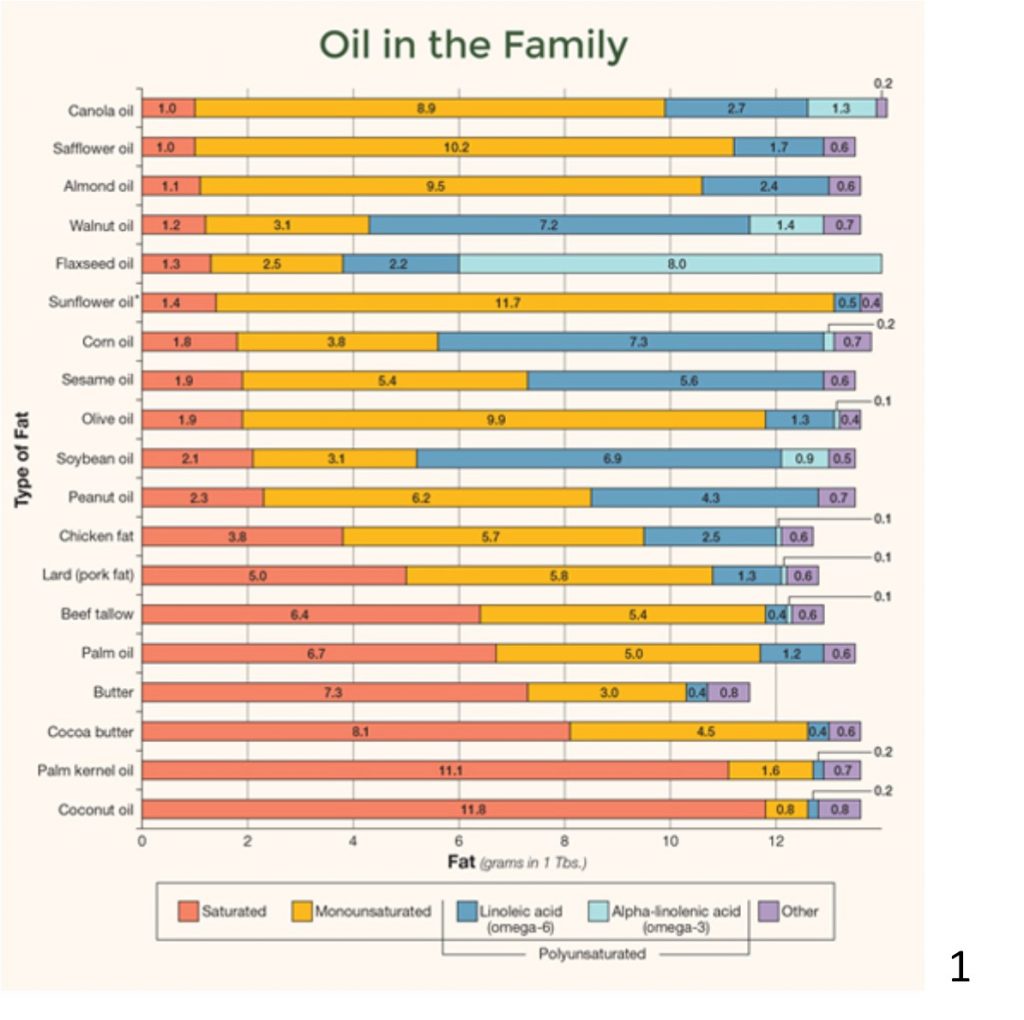Saturated fats are such a huge point of confusion. Many conventional authorities still treat them as poison while some health experts treat them as magic elixirs.
The truth is obviously between these extremes but where is it exactly and how much is best for you?

Saturated Fats: Good Or Bad?
First, I want to help you move past the idea of good or bad as it concerns saturated fat. The truth is that we have seen these cycles of opinion come and go. In the past, it was thought that saturated fat was strictly bad, evil, and poisonous to the body.
In recent years, and because that data was weak, we have moved onto the opposite side of the spectrum. Nowadays, you are more likely to hear people talking about the benefits of saturated fats – and the benefits of getting more into your diet.
The truth is that saturated fat is not evil, and it’s not a magic tonic that will cure everything. It is neither good nor bad, instead, we need to understand that some saturated fat in your diet is fine – but how much? Today, I want to dive more into that idea with you.
Another important idea to note is that when we talk about foods like butter being a high source of saturated fats, but the truth is that all foods that have fat or oil in them contain some form of saturated fat. This includes things like:
- Salmon
- Flax
- Olive
- Canola
You can get a better understanding of all the different types in this chart right here:

Bottom Line: There is no such food that is only unsaturated, monounsaturated, or polyunsaturated. All these foods have different types, and while some might be higher than others, there is no one food that is strictly saturated.
Saturated Fats & American Diets
So, let’s provide a little bit more context of where we might find saturated fats in our everyday diets. In terms of the standard American diet, the more dense sources of saturated fats often come from:
- Cheese
- Pizza
- Grain and sugar-based desserts
- Dairy desserts (like ice cream)
- Processed meats
- Burgers
- Whole milk
- Egg yolks
- Butter
- Potato chips
If you are on the paleo diet, you might be getting saturated fats from these sources:
- Meat
- Dark meat poultry
- Butter
- Coconut oil
Finally, if you are vegan, this is where you might find some saturated fat in your diet:
- Coconut oil
- Margarine
- Vegan “cheeses”
Subbing In Saturated Fats

In the discussions of saturated fats being good or bad, a distinction that is not often made involves the idea of what you are replacing in your diet. If you get rid of saturated fats in your diet, what is taking its place?
The fact is that you cannot move one part of your diet in isolation. If you take our saturated fats and make no other changes, your food intake is now lower. This means that you now have less fuel to burn, which will have an obvious effect on your body as a whole.
If you did happen to take the same foods you ate otherwise, apart from those containing saturated fats, and ate more of them, now you have shifted your diet in a completely different way (and the same applies if you replace foods containing saturated fats with new foods).
So what happens when we substitute saturated fats for others? Here’s what we know…
Polyunsaturated Fats
What we have learned is that when you substitute polyunsaturated fats for saturated fats, we encounter a 27% reduction in total death risk.2
Monounsaturated Fats
If you were to substitute saturated fats for monounsaturated fats, research has shown that it would result in 10% less risk of death.3
Carbohydrates
What about carbs? To date, studies involving this idea did not differentiate between processed and unprocessed carbohydrates. The data, to this point, has been mixed, with no real conclusion to be drawn that it would be positive.4
One inaccurate conclusion that was drawn, however, was that saturated fat was harmless. This is definitely not the case, and the more accurate conclusion is that saturated fat is potentially no more harmful than processed carbohydrates.
The PURE Study
This was another paper that created a big uproar, and if you want to go more in-depth about the PURE study I have also talked about it before (Read: Understanding the pure study, can carbs kill). This was a study done on urban and rural populations in Asia, and what they say was that the lowest intake of saturated fats (coupled with the highest intake of carbohydrates) corresponded with an elevated risk of premature death.5
The pitfall here is all in the details. In terms of saturated fats, a low-saturated fat diet was made up of 2 – 4% of total calories (and 10% total calories or less from total fat). On the other hand, those same diets which were high in carbs were 70% carbohydrate diets.
The truth is, unfortunately, and as noted by the researchers themselves, that these were “poverty diets.” Diets comprised of little more than rice, with almost no other foods, including no:
- Vegetables
- Protein sources
- Healthy fats
Key Insight: Therefore, the PURE study is not an accurate representation of carbs (and that they are somehow bad or more likely to kill you). They are all good, with the right attention to balance.
In that very study, they showed that the lowest rate of mortality was amongst those who consumed between 5 – 9% of saturated fat. Ultimately, that is consistent with what we have seen in other research.
Bottom Line: All in all, it is not that saturated fat is more necessary in our diets. Instead, we need to know where someone is, and if they are getting the right amount for their current needs.
Brain Aging

This is definitely something that I want to touch on and explore with you. There has been a lot of talk about the concept of brain aging, and the role saturated fats can play in it (Read: Is butter back).
The popular rationale is that your brain uses saturated fat, and that saturated fats can act as a tonic to strengthen your brain. The assumption is that if you consume more saturated fat, you are aiding your brain and helping it perform better.6
What this is based on, though, is a hypothesis (an idea). When we look at outcome studies involving real people, and their brain health, the results are not as promising. In actuality, the net effect of the largest studies show that higher sat fat intake raises risks of:
- Alzheimer’s dementia
- Dementia
- Cognitive decline
- Moderate cognitive impairment
Those studies have shown that those who consume the highest amount of saturated fat have had the earliest versions of those diseases.

Is Butter Back?
What about butter, though? Some have suggested that butter might have unique properties and that it might act as a cure-all for the brain in the same way as others have posited about saturated fats more generally.
There is one study that I wanted to share with you to explain this point. This one looked at dietary patterns and the risks of Alzheimer’s disease (as per a brain MRI) in 52 women (who shared an average age of about 54).7

The top image shows brain metabolism and health within individuals on distinct dietary patterns. This includes a diet consisting of:
- Whole grains
- Legumes
- Fish
- Nuts

This image comes from a very different diet. One consisting of:
- Meat
- Butter
- Full-fat dairy
Bottom Line: After factoring in other known risk factors, dietary patterns correlated strongly with early signs of Alzheimer’s disease in these studied patients.
Cancer Risks
What we have also seen is that the highest intakes of saturated fats correspond with heightened cancer risks in some patients. This is true for:
- Breast cancer
- Prostate cancer
- Lung cancer
- Pancreatic cancer
Other Risk Factors
There are a few more risk factors that we can see from a heightened intake of saturated fats. These include:
- Diabetes
- Thyroid function (raising TSH and lowering T4, specifically)8
How Much Is Too Much?
Now that you know more about saturated fats, where you can find them, and the associated risks of having too much in your diet – how much exactly is too much?
Key Insight: Please make sure to keep in mind that there is a point where your intake of saturated fat poses no risk. It is going to be unique to you, but I am not telling you to avoid it entirely and cut it out immediately. Some is okay – it is just knowing how much.
As a function of total calories, 5 – 7% seems to display no emergent risks from saturated fats (none of the ones we have profiled above).
For a typical person, a woman, on an average diet, that might result in 8 – 11 grams of saturated fats, per day, with no associated risks.
You can think about it like this:
- Butter: 7 grams per tbsp
- Olive Oil: 1.9 grams per tbsp
- Almonds: 1.1 grams per oz
- Ground Beef (80% fat): 7 grams per 3 oz
- Cheese: 6 grams per oz
- Coconut Oil: 12 grams per tbsp
- Salmon: 0.7 grams per 3 oz
- Chicken Breast: 0.9 grams per breast
Bottom Line: I am a huge fan of diet logging. That means that if you have never had the chance to track your diet before, you should give it a shot. It can really open up a lot of doors to knowing more about your health, and then making the right decision for your health. It can be a lot of fun, too!
Action Steps: Saturated Fats

Of the food items listed above, you really do not need to avoid them entirely. Instead, you might want to avoid building all of your meals around these ingredients. Some butter here or there, or coconut oil, is no problem. What you need to do, though, is keep in mind how much you are taking in throughout the course of a day.
The other thing to keep in mind is that saturated fat can play a role in the body, but it does not depend on dietary sources to supply itself. This is essentially a breakdown between essential and non-essential fats.
Essential fats are the ones that our body needs, and cannot create on their own. Non-essential, as you might expect, are ones that our bodies make a fine amount of on their own. They do not need additional sources.
Bottom Line: Saturated fats are non-essential, meaning that we should not make them a focal point of our diet. So you can put down the butter coffee, without having to worry about never touching butter again. It is all about balance, and keeping an eye on what you are putting into your body on a daily basis.
Your Diet, Your Health, Your Life
Please keep in mind that there are always things you can do to change your diet, and to improve your life. When we discuss saturated fats, I want you to know that it is all about what you put into your body, and being aware of how much you have, how much you need, and what it is doing to you.
With that in mind, I would love for you to learn more about the Daily Reset Shake (Click Here) and the Adrenal Reset Diet (Click Here for Book). Depending on who you are, and the state of your health, it might just hold the key for you to taking your life back – and I would love for you to find out more.
Saturated Fats: Conclusion
Today, we learned that it is all about balance. Saturated fats are not the devil, but they are also not the magic bullet that you should use to improve your health. Instead, it can be dangerous in some contexts, but completely harmless in others.
Speaking of your health, please consider taking the Adrenal Quiz (Click Here) today to learn more about the state of your wellbeing. Whether it’s unlocking the secrets of your body, or simply learning a little bit more, I am sure it will help no matter where your health is at.
Sources
1 – www.nutritionaction.com/daily/fat-in-food/what-are-common-oils-made-up-of/
2 – https://www.ncbi.nlm.nih.gov/pmc/articles/PMC5475232/
3 – https://www.cnn.com/2016/07/05/health/good-fats-reduce-risk-of-death/index.html
4 – https://academic.oup.com/ajcn/article/86/6/1611/4649612
5 – https://www.ncbi.nlm.nih.gov/pubmed/19540385
6 – http://www.neurobiologyofaging.org/article/S0197-4580(14)00355-8/fulltext
7 – https://www.ncbi.nlm.nih.gov/pmc/articles/PMC4375781/
8 – https://www.ncbi.nlm.nih.gov/pubmed/29363248

1. Schedule a Thyroid Second Opinion with me, Dr. C, Click Here for Details
2. Download and use my Favorite Recipes Cookbook Here
3. Check out my podcast Medical Myths, Legends, and Fairytales Here
Dr. Alan Glen Christianson (Dr. C) is a Naturopathic Endocrinologist and the author of The NY Times bestselling Adrenal Reset Diet, The Metabolism Reset Diet and The Thyroid Reset Diet.
Dr. C’s gift for figuring out what really works has helped hundreds of thousands of people reverse thyroid disease, lose weight, diabetes, and regain energy. Learn more about the surprising story that started his quest.


